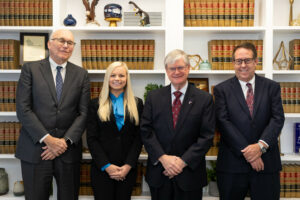The federal estate tax has continued to increase. In 2023, the federal estate tax only applies to estates worth more than $12.92 million. For a married couple, the exemption is $25.84 million, explains a recent article from The Alliance Times-Herald, “Estate, Inheritance Taxes.” Some people believe there should not be a federal estate tax, since anyone with enough assets to pay it also has the resources to avoid paying it. Beck, Lenox & Stolzer has worked with clients for almost 50 years to help minimize taxes and protect estate assets. We are happy to provide this review on how inheritance and estate taxes work.
Every year, married couples can give away a large amount of tax-free gifts to other people, including family members. The annual gift tax limit is currently $17,000 per person, so a married couple may gift $34,000 in annual tax-free gifts, reducing the value of their taxable estate ad benefiting their beneficiaries.
Estate taxes can also be avoided through the use of trusts. Most trusts give the surviving spouse rights to the assets with no estate tax on the assets put into the trust. For example, the surviving spouse may draw income from the trust, live in the house, etc. When the surviving spouse dies, the trust assets are then distributed to beneficiaries.
A charitable trust names a charitable organization as the beneficiary of the trust assets. Assets in the charitable trust can include cash, stocks, real estate and other property. Extremely high-net-worth families benefit from the use of foundations to own assets.
A Family Limited Partnership (FLP) is useful, since it allows family members to pool assets and then shift them to other family members. This is commonly seen in privately held family businesses and agriculture. Assets in an FLP transferred to others are removed from the estate, with significant estate tax savings. They are also used as a strategy to transition family farms from one generation to the next. The older generation manages the operation at first, and the younger generation, over time, can take over the operation.
Six states are still collecting inheritance taxes, Pennsylvania and Nebraska among them. Inheritance taxes are not calculated on the estate’s total but on the amount paid to each person who receives something from the estate. Neither Missouri nor Illinois collect inheritance taxes.
Inheritance taxes are levied on property inherited from parents, siblings, extended family and non-relatives. Only spouses are exempt. Tax amounts are typically based on the kinship relationship between the beneficiary and the deceased.
Families don’t have to be extremely wealthy to use trusts to protect assets from state estate taxes. They are also helpful when the family wishes to maintain their privacy, since assets held in trust do not go through probate and will not become part of the public record.
For families with privately owned businesses of any size, an experienced estate planning attorney can help create a Family Limited Partnership to work with the rest of the family’s estate plan. This will ensure the family business passes to the next generation without conflicting with the estate plan. Beck, Lenox & Stolzer has worked with clients for almost 50 years to help minimize taxes and protect estate assets. To schedule a phone conversation with one of our attorneys, please click here.
Reference: The Alliance Times-Herald (March 22, 2022) “Estate, Inheritance Taxes”










